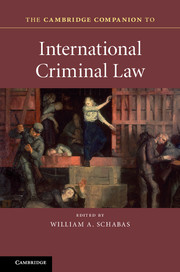16 - Charles Taylor
from PART IV - TRIALS
Published online by Cambridge University Press: 05 December 2015
Summary
The trial of the former president of Liberia, Charles Ghankay Taylor, by the United Nations-backed Special Court for Sierra Leone, was remarkable for several reasons. First, it was the only case before the Court involving a non-Sierra Leonean. Taylor is from neighbouring Liberia, where he is alleged to be responsible for crimes even worse than those committed during Sierra Leone's civil war. But Taylor, like all the other rebel leaders from his native country, has never been prosecuted for crimes committed in Liberia because the parties to that conflict effectively granted themselves amnesty. Rather, he was implicated by the Special Court for supporting Foday Sankoh, the leader of a rebel army called the Revolutionary United Front, to foment a war in Sierra Leone in which numerous atrocity crimes were committed. Sankoh and Taylor made ‘common cause’ to help each other take over their respective countries for personal and political gain.
Second, as a criminal trial, the case against Taylor was inevitably complicated. He reportedly never set foot in Sierra Leone during the time the offences for which he was charged were perpetrated. This meant that the prosecution's appropriate burden to prove the case beyond a reasonable doubt, when compared to the other cases before the Court, was going to be doubly difficult. Indeed, for most of the pre-trial and trial phases, the success of the case against Taylor appeared to hinge primarily on two expansive and controversial modes of criminal liability in international criminal law – joint criminal enterprise and command responsibility – neither of which requires the suspect to directly commit the acts in question. The task for the Court's prosecutors was how, using those two and other indirect theories of criminal participation such as instigating or ordering, they could link Taylor in Liberia to the offences carried out by the Revolutionary United Front and its collaborators in Sierra Leone. Interestingly, although it managed to secure Taylor's conviction for planning and aiding and abetting crimes in Sierra Leone, the prosecution failed to prove joint criminal enterprise and command responsibility.
Aside from Taylor, those persons tried by the Special Court were leaders of rebel, militia, or other organisations. Those convicted in the cases involving the Revolutionary United Front, the Civil Defence Forces, and the Armed Forces Revolutionary Council were part of the command structure of those entities.
- Type
- Chapter
- Information
- The Cambridge Companion to International Criminal Law , pp. 312 - 332Publisher: Cambridge University PressPrint publication year: 2016
References
- 2
- Cited by



